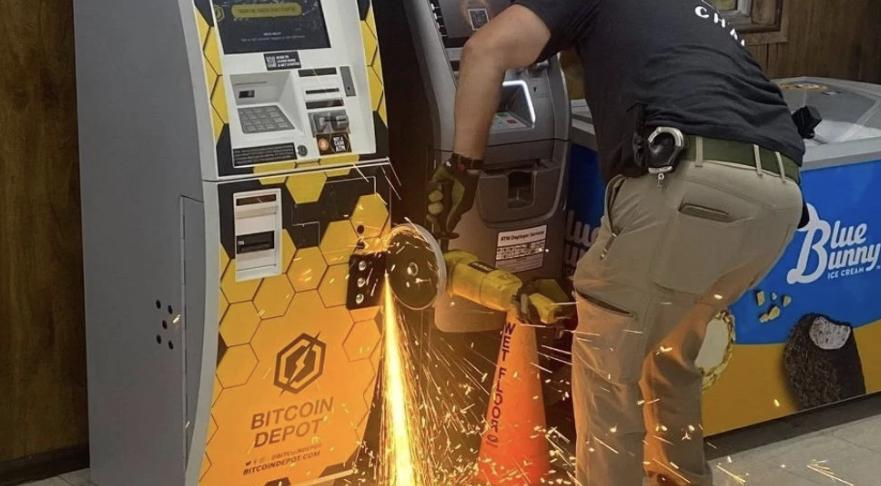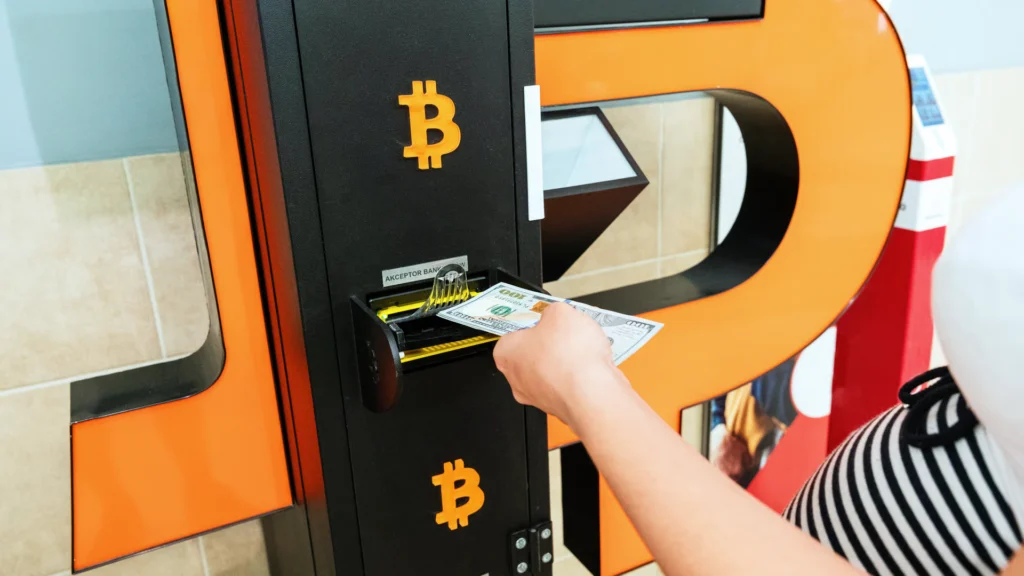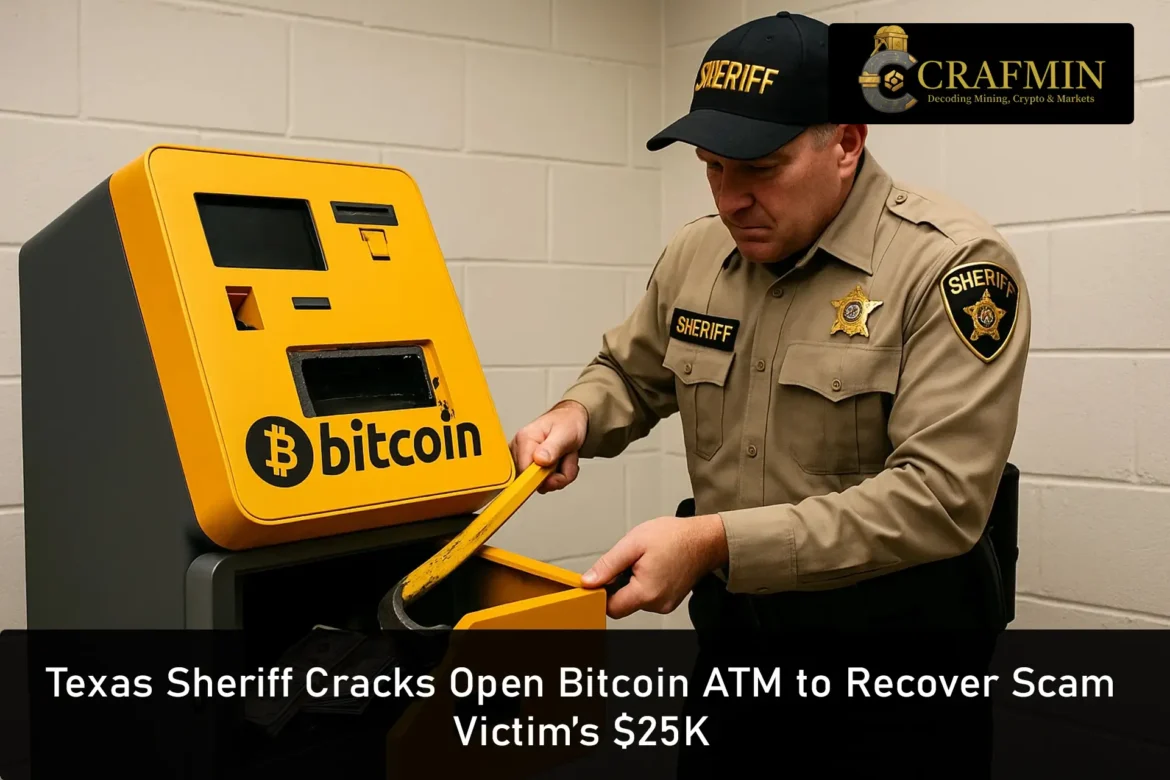Tucked away in a quiet patch of Texas, a local sheriff’s team sprang into action—tearing apart a Bitcoin ATM to claw back $25,000 that a family had unknowingly tossed into the hands of smooth-talking scammers. It’s the sort of tale you’d expect from a modern thriller—blending cutting-edge tech with old-fashioned policing.

Image 1 (Source: X)
It started with a phone call received by a household in Jasper County, just north-west of Houston. On the line was someone posing as a government official—smooth talk, confident tone, and laser-focused. The caller insisted the family faced a $25,000 fine and demanded payment in Bitcoin. Flummoxed and anxious, the family complied. They raced to the nearest Bitcoin Depot kiosk and transferred their savings, convinced they were settling a genuine debt to the authorities.
But the moment they hit “send,” the so-called government agent disappeared—poof. The money vanished into the ether, and the family was left grappling with a painful realisation: they’d fallen victim to a scam.
Sheriff Goes All-In
At the helm of the response was Sheriff Chuck Havard of Jasper County. Not one to stand idly by, he secured a search warrant and rallied his deputies. They turned up at the Bitcoin Depot terminal—tools in hand, and by midday they’d forced the kiosk open with a power saw. What followed was almost surreal: they retrieved about $32,000—exceeding the amount the family originally lost—promising to return every cent to its rightful owners.
Unsurprisingly, the tactic stirred up debate. Social media platforms and crypto forums lit up with opinions. Critics likened the raid to “police ripping money from a cash register after someone purchased gift cards as part of a scam.” One Redditor argued, “Unless the operator of the kiosk was complicit, this seems rather unjust.” Across the board, the sentiment was that, while Sheriff Havard’s motive may have been well-intentioned, his approach appeared heavy-handed—with collateral harm to innocent parties.
Sheriff Havard responded robustly. He stated that when scammers try to prey on good people in Jasper County, law enforcement pulls out all the stops. He emphasized that combating scams involving cryptocurrency often demands swift and inventive tactics. He likened the effort to walking a tightrope—complex, precarious, and fraught with risk. Despite the success in opening the ATM, the scammer himself remains at large, slipping through their grasp like a ghost in the digital wind.
Texas Sheriff cuts open Bitcoin ATM to recover $25K lost in scam!
Jasper County officials seized $32K from a Bitcoin Depot machine after a family was tricked into sending $25K to a scammer impersonating a government official.
More https://t.co/gqMtXPHq4z#Texas… pic.twitter.com/7mz9kDgjnh
— Coin Edition: Your Crypto News Edge ️ (@CoinEdition) June 20, 2025
The Crypto ATM Conundrum
This incident underscores a growing headache: crypto ATMs are no longer niche curiosities. They now occupy spaces in shopping centres, petrol stations, and convenience stores across the nation. When Bitcoin starts moving, you can bet your bottom dollar the tricksters aren’t far behind—ready to pull the wool over someone’s eyes. The FBI recently rang the alarm bells, revealing that crypto ATM scams shot up by 31% in 2024, draining a jaw-dropping $246 million. It’s a harsh reminder that while convenience opens doors, it also leaves the back window wide open for crooks to slip through.
Across the globe, officials are scrambling to clamp down. In Spokane, Washington, legislators prohibited crypto ATMs entirely after a surge of scams. Down under in Australia, watchdogs have drawn a line in the sand—slapping a cap of around $3,250 on ATM transactions to keep the sharks at bay and shield everyday folks from getting burnt.

Image 2: (Source: Quartz)
Law Enforcement in the Digital Age
Back in Jasper County, the sheriff’s daring ATM intervention attracted praise and scepticism in equal measure. Admirers hailed it as a gutsy gesture—a sign that local law enforcement can adapt to technological developments. Others, however, cautioned that bulldozing a kiosk might signal overreach, trample on property rights, and lack clear legal standing.
The biggest defense remains common sense. Government agencies do not call and demand payment in Bitcoin, gift cards, or cryptocurrency. If someone claiming to be an official demands these methods, shut it down—hang up, verify through legitimate channels, or contact local law enforcement or consumer watchdogs. Trust your instinct; if anything about the call “smells fishy,” it probably is.
Read also: Thailand Crypto Listing Rules: SEC Seeks Public Feedback on Digital Asset Criteria
Sheriff Havard may have cracked open a Bitcoin ATM to right a wrong, but the perpetrators behind the scam continue to slip through the cracks. This episode is about more than a busted kiosk—it’s a cautionary tale highlighting how fast technology can outpace the rulebook. Law enforcement is scrambling to stay ahead, sometimes resorting to no-nonsense moves, even as official procedures struggle to catch up.
The Bitcoin ATM may be back in pieces, but public trust—the intangible currency in this saga—is far harder to recover once it’s blown apart.

